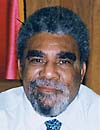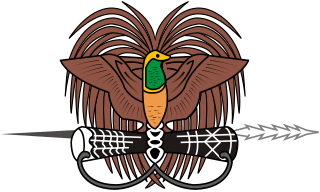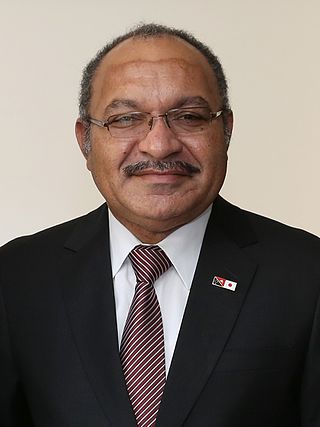Related Research Articles

The politics of Papua New Guinea takes place in a framework of a parliamentary representative democratic multi-party system, whereby the prime minister is the head of government. Papua New Guinea is an independent Commonwealth realm, with the monarch serving as head of state and a governor-general, nominated by the National Parliament, serving as their representative. Executive power is exercised by the government. Legislative power is vested in both the government and parliament.
Jeffery Nape was, until the 2012 election, speaker of the National Parliament and twice officially and once unofficially acting governor-general of Papua New Guinea. He was elected speaker by the members of the parliament on 28 May 2004, and then immediately became acting governor-general because that office was substantively vacant. He succeeded Bill Skate in both roles.

Sir Mekere Morauta was a Papua New Guinean politician and economist who served as the 7th Prime Minister of Papua New Guinea from 1999 to 2002. Inheriting a depressed economy and a fractious legislature, he embarked on fundamental reforms of the country's economy and political system.

The University of Papua New Guinea (UPNG) is a university located in Port Moresby, capital of Papua New Guinea. It was established by ordinance of the Australian administration in 1965. This followed the Currie Commission which had enquired into higher education in Papua New Guinea. The University of Papua New Guinea Act No. 18, 1983 bill repealing the old Ordinance was passed by the National Parliament in August 1983.
Chief Justice Sir Mari Kapi was a Papua New Guinean judge who served as the fourth Chief Justice of the Supreme Court of Papua New Guinea from 16 August 2003 until his retirement in 2008 for health reasons. Kapi was the first Papua New Guinean citizen to be appointed as a judge and only the third PNG national to be appointed Chief Justice.
Julian Ronald Moti QC CSI was the Attorney General of the Solomon Islands. He was born in Fiji and educated in Australia.

Sir Michael Thomas Somare was a Papua New Guinean politician. Widely called the "father of the nation", he was the first Prime Minister after independence. At the time of his death, Somare was also the longest-serving prime minister, having been in office for 17 years over three separate terms: from 1975 to 1980; from 1982 to 1985; and from 2002 to 2011. His political career spanned from 1968 until his retirement in 2017. Besides serving as PM, he was minister of foreign affairs, leader of the opposition and governor of East Sepik Province.

The National Executive Council (NEC), also known as the Cabinet of Papua New Guinea functions as the policy and decision-making body of the executive branch within the government system of Papua New Guinea. The Prime Minister and Ministers serve as members of the Cabinet.
Allan S. M. Marat CBE is a Papua New Guinean politician. He served as Minister for Justice and Attorney General in Prime Minister Michael Somare's Cabinet from August 2007 to May 2010. In May 2010, he publicly stated that major mining projects in the country brought little benefit to local communities, workers or businesses. He also "questioned legislation affecting the Ombudsman Commission". Prime Minister Somare consequently asked him to resign immediately, which he did. As a consequence of his resignation, Marat informed the Prime Minister that his Melanesian Liberal Party would "cut ties" with the government. He was replaced as Attorney General and Justice Minister by Ano Pala.

Peter Charles Paire O'Neill is a Papua New Guinean politician who served as the seventh Prime Minister of Papua New Guinea from 2011 to 2019. He has been a Member of Parliament for Ialibu-Pangia since 2002. He was a former cabinet minister and the leader of the People's National Congress between 2006 and 2022. He resigned his position as prime minister to avoid a vote of no confidence, and he was succeeded by James Marape.
David Arore is a Papua New Guinean politician. He was a member of the National Parliament of Papua New Guinea from 2007 until unseated by a court decision in 2015 and again from a 2015 by-election until 2017. He was Minister for Higher Education, Research, Science & Technology under Peter O'Neill from 2011 to 2014.
Belden Namah is a Papua New Guinean politician. Namah is a member of the National Parliament for the Papua New Guinea Party, and has represented Vanimo-Green River District since 2007. He served in the Cabinet from 2007 to 2010, and as Deputy Prime Minister from 2011 to 2012. In 2012, Namah became a member of the opposition. After retaining his seat in the 2022 election, he said that he would not rejoin the opposition.
2011–2012 Papua New Guinean constitutional crisis was a dispute between Sir Michael Somare and Peter O'Neill. Both claimed to be Prime Minister of Papua New Guinea.

General elections were held in Papua New Guinea from 23 June until around 13 July 2012, after being postponed by a further week to allow for security personnel to crisscross the country, particularly the highland provinces. The elections followed controversy over incomplete electoral rolls and a constitutional crisis caused by a dispute over the office of prime minister between Michael Somare and Peter O'Neill.
Paul Tiensten is a former Papua New Guinean politician and former National Alliance Member of Parliament for Pomio Open. Tiensten is currently serving a nine-year sentence for corruption.
Peter Wararu Waranaka is a Papua New Guinean politician. In 2004 he was elected Member of Parliament for Yangoru-Saussia for the National Alliance Party and was appointed the Governor of East Sepik. The National Court had initially nullified Waranaka's election, after it was contested by Gabriel Dusava, but his victory was later confirmed.

The 2012 Papua New Guinea Defence Force mutiny took place on 26 January 2012 when a group of military personnel headed by retired Colonel Yaura Sasa took the commander of the defence force, Brigadier General Francis Agwi, prisoner. The mutiny was related to a dispute over the prime ministership between Sir Michael Somare and Peter O'Neill which had begun in December 2011 when the Supreme Court of Papua New Guinea ordered that Somare be reinstated as the prime minister while the country's parliament supported O'Neill.
Yaura Sasa is a Papua New Guinean retired army colonel who led the failed 2012 Defence Force mutiny on 26 January 2012. Sasa and approximately 20 PNG soldiers seized control of the main administrative compound in the Defence Force Headquarters, Murray Barracks located within the capital Port Moresby. The group, led by Sasa, also briefly captured the commander of the Papua New Guinea Defence Force, Brigadier General Francis Agwi and placed him under house arrest along with other higher-ranking officers.
Investigation Task Force Sweep was established in Papua New Guinea (PNG) on 12 August 2011, following a resolution by the National Executive Council (NEC). The initiative was spearheaded by Prime Minister Peter O'Neill as part of his well-publicised anti-corruption drive.
Sir Gibuna Gibbs Salika is the current Chief Justice of Papua New Guinea. He is currently the longest serving judge of the National and Supreme Court of Papua New Guinea.
References
- ↑ Nanol, Firmin (26 March 2009). "Former PNG Chief Justice dies". Radio Australia . Retrieved 13 April 2009.
- ↑ "Former PNG chief justice to lead UBS inquiry". RNZ . 8 August 2019. Retrieved 13 April 2020.
- ↑ "PNG government suspends Chief Justice". Radio New Zealand International. 11 November 2011. Retrieved 11 November 2011.
- ↑ "Hearings resume in PNG's Somare ouster case". Radio New Zealand International. 25 October 2011. Retrieved 11 November 2011.
- ↑ AAP (December 2011). "PNG Supreme Court orders arrest of deputy PM and attorney-general after the country's top judge is suspended". The Wall.
- ↑ AAP (22 March 2012). "PNG bill 'targets chief justice'". MSN News.
- ↑ Jo Chandler (22 March 2012). "Outcry as PNG government wins power to remove judges". The Age.
- ↑ Eoin Blackwell (25 May 2012). "Papua New Guinea Chief Justice Sir Salamo Injia held for sedition". The Daily Telegraph.
- ↑ Eoin Blackwell (29 May 2012). "Reaffirm independence for PNG judges: ABA". Sydney Morning Herald.
- ↑ Todagia Kelola (30 August 2012). "PM drops charges". Post Courier. Archived from the original on 16 April 2013.
- ↑ islandsbusiness.com (3 September 2012). "Charges against PNG judges struck out, ex – soldiers ask govt to reinstate them". islandsbusiness.com.
{{cite web}}:|author=has generic name (help) - ↑ PINA (7 March 2012). "Police charge PNG chief justice". PINA.
- ↑ AAP (12 March 2012). "PNG police chief defends arrest of judge". AFR.
- ↑ PINA (14 March 2012). "PNG court drops chief justice case". PINA.
- ↑ Eoin Blackwell (13 March 2012). "PNG court drops chief justice case". The Sydney Morning Herald.